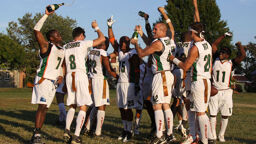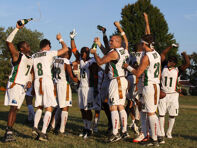The first time someone suggested to Desiree Abrams that she become a football official, or even an NFL referee, the hard-hitting player wasn’t having it.
“They’re terrible.”
That was Abrams’ reaction when the general manager of her women’s tackle football team – the DC Divas – suggested she consider officiating football.
It was an offensive suggestion to her at the time, as though someone like Abrams would even consider being part of a group she thought screwed up calls so often.
Get off the sidelines and into the game
Our weekly newsletter is packed with everything from locker room chatter to pressing LGBTQ sports issues.
Yet the GM had seen something in Abrams: His blossoming player had begun demonstrating an interest in, and attention to, the different parts of the sport beyond just the physical hitting of other people that had attracted her to the sport in the first place.
“I started paying more and more attention to the different aspects of the game,” Abrams said. “My general manager, Rich Daniel, asked me about officiating. And I said, ‘Why would I want to do that? I’m the one who yells at them.'”
With her resistance, he pitched it to her as part of her simply doing her job for the Divas.
“You can learn from them and report back to us with some information,” he told her at the time. It’s a strategy employed by teams at every level across the country, looking for insights from officials, how they view the game, what they won’t call as a foul and what they will.
“I thought, ‘Sure, I can find out what I can get away with,’” Abrams remembered.
That was the beginning of a pioneering career that has brought Abrams to the NFL Replay Booth on Sundays, working college football games on the field, and coaching other officials across tackle football and the fast-growing sport of women’s flag football.

Related


When will an all-female referee crew officiate an NFL game?
With the NFL hiring Karina Tovar as its 4th on-field female referee, the next question is when will the league have an all-women crew.
By Cyd Zeigler | April 23, 2024
Very quickly Abrams realized that, despite her increased study of the game, she knew relatively nothing about it. Delving into the rulebook, learning the mechanics of officials — and yes, getting calls wrong — she quickly understood that there was so much more to the inner workings of football games than she could have imagined.
Officials actually — she soon realized — know what they’re doing.
It took a couple years, but she eventually left the pads for yellow flags, diving into football officiating like she never imagined possible. She worked high school football games, soon joining the Eastern Board of Officials, a mostly Black organization training and elevating football officials. Abrams is still listed as an EBO member.
“They provide a unique opportunity to affect change,” Abrams said of the EBO.
In a recent chapter of her legacy that started with the EBO, she was part of the historic first all-Black NFL officiating crew last season that worked a game between the Los Angeles Chargers and the Las Vegas Raiders last December.

Could Abrams be part of the NFL’s first all-female officiating crew for a game? We’re likely a decade away from that possibility.
What is the job of an NFL Replay Assistant?
As a Replay Assistant, Abrams is part of an NFL replay duo, with the Replay Official. They work together in the replay booth as a team, coordinating with a couple other game administrators in the booth, the TV broadcast truck whether it’s CBS, NBC, ESPN or otherwise, the officials on the field and the NFL officiating central command in New York.
The RA, as they’re called, works with the RO every play. They have responsibilities every second of the game: to make sure there are 11 players on each side every play, that no one illegally goes out of bounds on a kickoff, that the ball is spotted on the correct yard line, that a drop wasn’t called a catch, and a plethora of other calls that include challenges by coaches.
Abrams’ role in the NFL replay booth is an important one for the game.
Developing women’s flag football
She is also part of the shift in developing the sport for women. For decades, football’s attention has been entirely on the almost entirely male sport of tackle football.
Yet as girls’ and women’s flag football enter a fast-growing stage in the United States and around the world, Abrams finds herself spending time working both sports.
“With the increase of flag football across the world, that has been taking up a significant amount of my time as well.”
Alongside the NFL, she is working with the NAIA to create a standard rules book for women’s flag football. She hopes to be part of the NCAA rules and development committee when the NCAA commits to women’s flag football as a sanctioned sport. Given the fast-growing interest, that is likely to happen soon.
She’s also a Global Flag Football Ambassador for NFL Flag.
She’s working to train officials to correctly officiate flag football. Officiating the two sports is very different.
Just last week she worked the NAIA Women’s Flag Championships at Mercedes-Benz Stadium in Atlanta, then attended the 2024 CFO National Referee’s Clinic in Dallas for referees in college football.
The football demands on her time are extraordinary.
It’s a lot of work, for which officials like Abrams generally don’t get the credit they deserve, and don’t get the financial reward they deserve either.
Balancing football officiating and marriage to her wife
That can all make balancing a marriage all the more complicated. Abrams knows this well.
Abrams first saw her then-future wife in a salsa and merengue club, called Atlantis, in Tallahassee. At the time, Abrams was a walk-on on the women’s basketball team for the Florida A&M Lady Rattlers. That fleeting encounter left Abrams smitten.
It was a chance meeting later at a friend’s house that this “beautiful brown-skinned woman” happened to be chilling out when Abrams walked in.
“She was flipping her hair and batting her eyes,” Abrams remembered. But still, she wasn’t sure she was available to her. While Abrams wondered if she was interested in dating women, she heard the bad news: The “beautiful brown-skinned woman” was dating another girlfriend at the time.
Two years later when that ended, the two women began dating, ultimately marrying and now living together in Washington, D.C.
Yet as with so many officials, Abrams was also in a pretty intimate relationship with football.
“She definitely made the comment, ‘Either I’m going to love football or hate you,” Abrams remembered. “‘So I guess I need to start learning football. I’ve got to figure out how to cope with this.'”
It’s a refrain common to every football official in a relationship at just about every level. For four to six months of the year, officiating the sport becomes a third wheel. That’s not including off-season training, study and camps.
Abrams and her wife have found a way to make that work.
“It’s a constant relationship negotiation. I do my best to try to plan something once a month, where we go on a date or go on a vacation.” They also have a weekly night-off where it’s just the two of them.
Earlier this year at the Super Bowl, Abrams was very open about being gay and married to a woman, at an event hosted by GLAAD and the NFL.
Ten years from now, Abrams said she would love to be back on the field, working Division I college football. She’d love to be a white-hat.
She’d also entertain being a coordinator of officials for a conference. Or have a front-office job managing officials for women’s flag football.
Still, the smell of the freshly cut grass, or 100-degree-turf in late August, calls to her.
“I love the field. There’s no comparison for me. From being a player experiencing the field, it’s the best aspect of officiating if I had a choice.”
Though she certainly has pause. Every rule has an exception.
“In January, not having to deal with the elements, it’s kind of nice being in the booth.”
You can follow Desiree Abrams on Instagram.








































